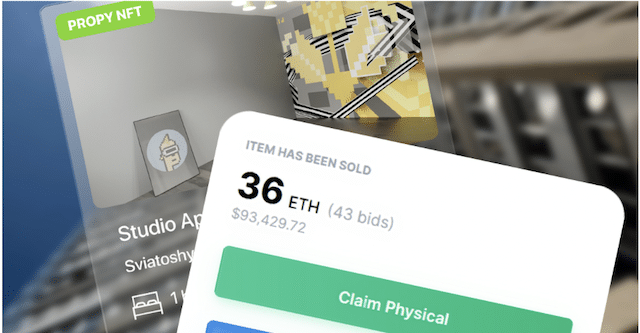Unlocking the Future: A Guide to Buying a House with Cryptocurrency – Mortgages, Payments, and Insurance
Publikováno: 29.12.2023
Finance and money technology background concept of business prosperity and asset management . Creative graphic show economy and financial growth by investment in valuable asset to gain wealth profit . Believe it or not, 2024 may be a popular year for homebuyers. The National Association of Realtors (NAR) recently predicted that home sales will begin […]
The post Unlocking the Future: A Guide to Buying a House with Cryptocurrency – Mortgages, Payments, and Insurance appeared first on Cryptonews.

Believe it or not, 2024 may be a popular year for homebuyers. The National Association of Realtors (NAR) recently predicted that home sales will begin to rise next year, with 4.71 million existing homes forecasted to be sold in 2024. According to NAR, this would represent a 13.5 percent increase in home sales compared to 2023.
Industry experts are also predicting that the price of Bitcoin will go up in the coming year. The increasing interest in real estate, coupled with a new bull run, may lead some to wonder whether or not they should purchase real estate using cryptocurrency.
Buying real estate using cryptocurrency: A growing trend
Although buying a home with cryptocurrency may not yet be a common practice, some industry experts believe that this will be a trend in 2024 and beyond.
Natalie Karayaneva, founder and chief executive officer of Propy – a company that automates real estate transactions using blockchain technology – told Cryptonews that 11 percent of all homebuyers used cryptocurrency for down payments in 2021. Karayaneva mentioned that the 2021 bull run likely helped drive this interest. “Each bull run cycle will often result in a growing trend of people interested in buying real estate with cryptocurrency,” she remarked.
According to Karayaneva, Propy has processed thousands of transactions since the company’s inception in 2017. “Propy has surpassed $4 billion worth of volume on our blockchain network, handling millions of dollars in crypto payments,” she said. Karayaneva further believes that the first home sale conducted by Propy paved the way for other sales. She said:
“The first home sale conducted by Propy was wrapped as a non-fungible token (NFT) and bought within 5 minutes by a Gen Z, who paid ETH directly to a smart contract. Another sale was made using Bitcoin to Bitcoin, as the home seller wanted cryptocurrency.”

Unsurprisingly, the home buying process using cryptocurrency has evolved over time. For instance, Karayaneva explained there are now several steps involved when it comes to buying a home through Propy. She mentioned that interested buyers first need to register on the Propy platform, undergoing Know Your Customer (KYC) and Anti-Money Laundering (AML) verification processes. Users can then initiate a purchase by making a cryptocurrency transaction for the selected property.
“Propy facilitates each transaction through its platform, allowing users to pay in various cryptocurrencies, utilizing third parties licensed for exchanging, or crypto-to-crypto facilitation,” Karayaneva explained. Propy then employs smart contracts to execute the transaction. “These contracts ensure the terms of the agreement between the buyer and seller are met. Propy Title – an escrow and title licensed company – executes on title search and transfer,” she added.
Upon successful completion of the transaction, the property title is recorded in the local county and put on the blockchain. Karayaneva added that transfer of title can be completed via an NFT process, which often requires a two week preparation for the seller.

Other platforms are enabling the use of cryptocurrency for real estate transactions. For example, BitPay – a Bitcoin payments service provider – recently published a blog post outlining how to buy a home using cryptocurrency though BitPay. According to the article, BitPay can facilitate cryptocurrency real estate transactions on behalf of buyers and sellers. The post states:
“An email invoice will be generated by the selling party. The buyer receives the invoice and pays from their preferred crypto wallet, either manually or by scanning a QR code. BitPay then transfers the funds to the seller via direct deposit.”
Moreover, BitPay partners with a handful of real estate groups, allowing buyers to use cryptocurrency to purchase homes in different locations.

Some platforms are also enabling crypto holders to purchase portions of real estate using stablecoins tied to the US Dollar. Jerry Chu, chief executive officer of Lofty AI – a real estate tokenization platform – told Cryptonews that all of the transactions on Lofty settle using the blockchain and USDC, which is a US Dollar pegged stablecoin. Chu believes that through this process there isn’t a strong shift from the traditional method of buying or selling real estate with fiat. “The shift is more so to using the dollar in a more efficient manner to enable a better transactional experience for these users,” he said.
Chu explained that Lofty is a platform that functions as a marketplace where homeowners can directly sell their properties to buyers online. He said:
“Traditionally, if a seller wanted to sell a house, they would have to sell either 100 percent, or nothing at all, and could typically only sell to one buyer. On Lofty, the ownership of all properties are divided into smaller fractions. Sellers can now sell any amount of equity in their properties to any number of buyers.”
In order to buy real estate on Lofty, Chu explained that every user must go through a full KYC process. “Once this is successfully completed, they can connect a crypto wallet to their account or use the default one generated for them,” said Chu.
Chu shared that interested home buyers can then navigate through the Lofty marketplace to browse over 135 properties for sale. He added that all the due diligence materials and disclosures are made publicly available for the featured properties. “This includes inspection reports, appraisal reports, seller background checks, credit ratings, and much more,” he said.
Once a buyer decides to invest in a specific property, Chu explained that they are directed to a transaction screen, where they can select how much to buy and at what price point. According to Chu, payment options include USDC, along with other cryptocurrencies. “Once the buyer submits the offer, a smart contract will match and settle the transaction instantly. The buyer will have received ownership in the property through ‘property tokens’ in their wallet and the seller will have received USDC in theirs, finalizing the transaction,” said Chu.
Mortgages and insurance for crypto real estate transactions
As using cryptocurrency to purchase real estate gains traction, it’s also important to consider the role of mortgages and insurance.
Karl Jacob, chief executive officer and co-founder of LoanSnap – a mortgage company specializing in cryptocurrency transactions – told Cryptonews that mortgages play a crucial role because they allow buyers to borrow money against homes they wish to purchase. While this may be, Karayaneva pointed out that mortgages secured using crypto are still a burgeoning concept. However, she noted that it’s possible to get a mortgage through various decentralized finance (DeFi) platforms and crypto mortgage startups.
This in mind, Jacob explained that LoanSnap works directly with consumers to get a “SMART Loan,” which he described as an improved version of a home equity line of credit, or a HELOC. He said:
“Users should first go to the LoanSnap website and enter their name and address. The system will then look through thousands of options to find the best fit. Then one of our dedicated Loan Officers will reach out to discuss each option. If you qualify, then you will get access to the LoanSnap portal where you can upload documents necessary to process your mortgage. The whole process generally takes two weeks or less.”
BitPay also offers a feature called “Bill Pay” that allows users to make mortgage payments with Bitcoin and other well performing cryptocurrencies. According to BitPay’s blog post, Bill Pay can be used regardless if a loan provider accepts crypto payments.
In addition to these options, John Wingate, chief executive officer and founder of BankSocial – a financial services company leveraging blockchain technology – told Cryptonews that BankSocial has two products that enable crypto holders to receive loans for large purchases. According to Wingate, BankSocial allows users to sell cryptocurrency directly to the company. The platform can then provide proof-of-funds and a user’s KYC and AML information when it comes to closing funds involving crypto sales.
In addition, Wingate explained that BankSocial offers a “leverage crypto loan,” which allows crypto holders with well performing assets – like Bitcoin or Ethereum – to use these as leverage for a nonrecourse loan. “For example, we will take your Bitcoin at a 60-70 percent leverage up to five years out and will give you a loan not tied to the asset of the house. That way if your crypto goes up during that time period, you can basically pay off your loan without ever having to sell the crypto,” said Wingate.
Loans and mortgages indeed play an important role for crypto holders wishing to purchase real estate. For instance, Jesse Grushack – a self-employed entrepreneur – told Cryptonews that he has been heavily involved in the blockchain sector since 2011 and that the majority of his money is in cryptocurrency.
Yet when it came to buying real estate, Grushack shared that he couldn’t obtain a traditional mortgage. Therefore, he looked for other solutions. Grushack said:
“I checked Aave and saw they were offering 2.85 percent loans on ETH. Since I had the collateral, I was able to take out a loan in about 10 minutes, pull out the GUSD stablecoin, and transfer it to my bank within the hour.”
While this process was easy enough for Grushack, he explained that the interest rate was dynamic. “When Gemini had issues with earn, the GUSD rate skyrocketed to 78 percent. Just as long as I keep an eye on the collateral and keep my Aave score above 2.5, I can manage 7 percent interest.
While mortgages and loans help crypto holders complete real estate transactions, it’s also noteworthy that home-owners insurance may be available. Karayaneva shared that title insurance is applicable if buyers are closing with a crypto-friendly title company like Propy Title and Escrow. Yet she pointed out that comprehensive insurance tailored explicitly for crypto real estate transactions is still in its nascent stages.
Advantages and disadvantages of using crypto to buy a home
While the notion of buying real estate using cryptocurrency may sound appealing to crypto investors, there are both pros and cons to consider.
For instance, Karayaneva noted that crypto payments enable global accessibility, allowing individuals across the globe to participate in real estate transactions. “This accessibility opens up investment opportunities to a broader global audience,” she said.
Faster transaction time is another major benefit of crypto payments. The use of smart contacts and blockchain technology enables automated processes that would otherwise take days to complete. Karayaneva shared that Propy has conducted NFT transactions that only took a matter of minutes for payment and title transfer processes.

In addition, leveraging blockchain technology for real estate transactions provides security and transparency, as each transaction is publicly recorded on an immutable ledger. According to Karayaneva, this transparency enhances security and reduces the risk of fraud or manipulation, offering a higher level of trust in property ownership records.
Diversification of investments is another good reason to consider buying real estate using cryptocurrency. Real estate may even be considered by some as a more stable investment.
Of course, there are some disadvantages that may come about when deciding to purchase a home using cryptocurrency. The most obvious examples of this would be unwillingness from sellers to accept crypto payments. Price volatility and the daily fluctuations in crypto prices may also be viewed as a drawback. Understanding the taxation process could also be complex.
Moreover, regulatory uncertainty around digital assets in the US and other regions of the world will likely impact the process of buying real estate with cryptocurrency. As such, it’s important for potential home buyers to work with licensed crypto-friendly companies and always do their own research.
Embracing a new era in real estate
Using cryptocurrency to purchase real estate will likely be a growing trend as interest in digital assets continues to increase. Being able to better understand the home buying process is therefore important for crypto investors and newcomers alike.
Moreover, while platforms like Propy, BitPay and Lofty seem to be gaining traction, other options are becoming readily available. For example, a Zillow-like website called “MyEListing.com” launched in April 2023, allowing homebuyers to easily search for real estate options in Texas that can be purchased using cryptocurrency. According to a press release, MyEListing partners with Coinbase Commerce, allowing crypto transactions to close within one business day.
Everlodge is also an up and coming decentralized finance (DeFi) marketplace for travel properties. Crypto investors will soon be able to buy fractions of NFTs that represent ownership in properties offered by Everlodge. Although this model is different from buying a home using crypto, the benefits of Everlodge include property ownership, receiving rental income, price appreciation, and more.
All things considered, using cryptocurrency to make home purchases is likely one of the best use cases for well performing cryptocurrencies, along with blockchain technology. To put this in perspective, Chu noted that homebuyers rarely buy real estate from large, centralized companies. Rather, the process is primarily peer-to-peer. He said:
“Blockchains excel at trust-less, peer-to-peer transactions of assets and values above anything else, so the two really are a perfect fit. This is probably why you’re starting to see a proliferation of companies in this space, along with a large amount of interest from crypto holders.”
The post Unlocking the Future: A Guide to Buying a House with Cryptocurrency – Mortgages, Payments, and Insurance appeared first on Cryptonews.